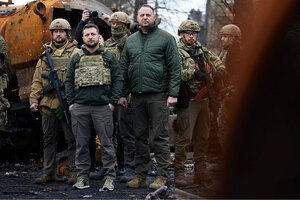How much will Europeans sacrifice to save Ukraine?

Ukrainian President Volodymyr Zelenskyy stands next to destroyed Russian military vehicles, as Russia's attack on Ukraine continues, in the town of Bucha, outside Kyiv, the site of alleged Russian war crimes, on April 4, 2022.
Ukrainian Presidential Press Service/Reuters
London
It feels jarring – almost disrespectful – to write these words as civilian corpses are cleared from the streets of Bucha, Ukraine, after Russian troops retreated from the Kyiv suburb. But Ukraine’s fate may well now hinge on a crude question of international politics.
It is this: How long can Washington and its European partners – governments and citizens – maintain their unity in support of Ukraine?
Ukrainian President Volodymyr Zelenskyy, with his Western backers, is hoping to beat back the Russian assault as quickly and effectively as possible.
Why We Wrote This
Western solidarity with Ukraine will last as long as public sympathy holds. Vladimir Putin is betting democracies cannot withstand hardship. Can Europe and the U.S. prove him wrong?
But Vladimir Putin seems to be betting that the longer the war goes on, the harder Mr. Zelenskyy’s democratic supporters will find it to withstand the knock-on effects of economic sanctions in their own countries, and that their alliance will fracture.
Which side prevails will likely become clear only in the months ahead. Yet high-level allied discussions over the next few days may well give us some clues about the degree of Western determination.
For now, the allies’ motivation to stand firm remains strong, not least because of the evidence discovered over the weekend in Bucha and elsewhere suggesting that Russian soldiers summarily executed or raped several hundred Ukrainian civilians before they pulled out of the Kyiv region.
That has been a shocking exclamation point to a lengthening list of Russian strikes against civilians, including the entrapment of tens of thousands in the battered and besieged port city of Mariupol, that have horrified European public opinion.
American and European leaders, outraged by the latest reports of civilian deaths, have denounced the alleged war crimes and threatened further sanctions in response.
Washington is reportedly coming round to the idea that its European NATO partners should provide Ukraine with urgently needed additional weaponry that could include Soviet-era battle tanks and more powerful anti-aircraft batteries.
Mr. Zelenskyy has been increasingly forthright in calling on European governments to stop buying Russian oil and gas, and thus stop paying for Mr. Putin’s war machine. Germany, the European Union’s main economic power and a major Russian gas importer, has until now refused to go so far. In response to the gruesome reports from Bucha, however, Berlin has hinted it may reconsider its stance.
Yet the question of a gas embargo is part of a wider long-term challenge to the allied pressure campaign against Mr. Putin. Sanctions that undermine the Russian economy also impose knock-on costs in European countries that are still dealing with the economic after-effects of the pandemic.
Rising energy prices, initially boosted by revived demand as pandemic restrictions eased, have been spurred even higher by market jitters over Ukraine. The mere possibility of interruptions to Russian energy exports to western Europe has made things worse.
As Germany knows only too well, since it relies on Russian gas for more than half its needs, the economic impact of a full-scale boycott would be dramatic, reducing supplies to both homes and industry.
Those Ukraine-related economic costs carry political costs as well for Western governments.
In France, where President Emmanuel Macron faces a reelection vote this month, his main right-wing challenger, Marine Le Pen, has been narrowing his opinion-poll lead. She has done so not by focusing on the war – uncomfortable territory given her past chumminess with Mr. Putin – but on the cost of living and inflation.
Protests over rising prices have also broken out in other European countries, including Spain, Italy, and Greece.
U.S. President Joe Biden, who has sought to control gasoline price rises by drawing on his country’s strategic oil reserves, is also clearly aware of the dangers of inflation ahead of November’s mid-term congressional elections.
The key question is how great a sacrifice Western countries will be prepared to make, and for how long, in order to help Ukraine turn back Mr. Putin’s invasion and terror campaign.
If the allies do stay the course, it will be – ironically – because of the strength and cohesion of an element that Mr. Putin is likely to have figured as a source of weakness in the democracies aligned against his attack.
Not allied presidents or prime ministers, but the voters on whom they depend.
Grassroots outrage, as much as politicians’ calculations, has helped forge the Western response to the invasion.
So far, opinion polls suggest that popular anger over what’s happening in Ukraine and a sense of solidarity with its people have remained strong. The dreadful scenes in Bucha will likely reinforce such sentiment.

